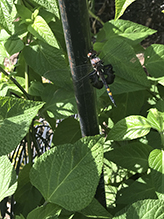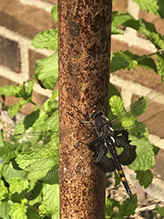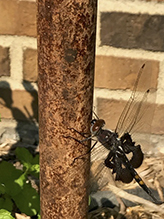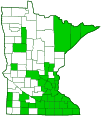black saddlebags
(Tramea lacerata)
Conservation • Description • Habitat • Ecology • Distribution • Taxonomy
Conservation Status |
|
|||||||
| IUCN Red List | not listed |
|||||||
| NatureServe | N5 - Secure SNR - Unranked |
|||||||
| Minnesota | not listed |
|||||||
Description |
||
Black saddlebags is a medium-sized to large skimmer. It is common in southeastern Minnesota, rare in the forested northeast, and uncommon or absent in the rest of the state. Adults are 1⅞″ to 2 3 ⁄16″ long and have a wingspan of 3¾″ to 4″. Females are larger than males. The body is teardrop-shaped and streamlined. The thorax is brown with a black oval spot on each side. The upperside is densely covered with long, straight hairs. The abdomen on males is mostly black. On females and juveniles there are whitish or yellowish spots on the upper (dorsal) side of abdominal segments 3 through 7 (S3–S7), the spots on S6 and S7 especially large. On the mature male these spots fade to black except on S7 and often S6. The forewing is slender and clear except for a small, black cell (stigma) on the leading edge near the tip. The hindwing is much broader than the forewing. It has a black stigma and an irregular but consistently shaped black spot covering the inner quarter of the wing. The shape is often compared to a theater comedy mask in profile. The inner margin of the hindwing is rounded, not notched. The forewing and hindwing triangles are a different shape. The face on males is black, on females and juveniles yellowish-brown. The compound eyes meet along a long margin at the top of the head. The hind margin of the compound eye is straight or only very slightly lobed. The legs are black. |
||
Size |
||
Total length: 1⅞″ to 2 3 ⁄16″ Wingspan: 3¾″ to 4″ |
||
Similar Species |
||
Habitat |
||
Ponds, lakes, marshes, backwaters of broad rivers, ditches, and sometimes temporary ponds, all with submerged vegetation |
||
Ecology |
||
Season |
||
Early June through September |
||
Behavior |
||
Males sometimes feed in large swarms. |
||
Life Cycle |
||
Mating takes place on branched of trees near water. With the male hovering nearby, the female deposits eggs, one at a time, by dipping the tip of her abdomen in slow-moving or stagnant water. |
||
Naiad Food |
||
Aquatic insect larvae and tadpoles. |
||
Adult Food |
||
Small flying insects |
||
Distribution |
||||
|
Sources |
|||
| 9/20/2022 | ||||
Occurrence |
||||
Uncommon to rare |
||||
Taxonomy |
|||
Order |
Odonata (Dragonflies and Damselflies) | ||
| Suborder | Anisoptera (Dragonflies) | ||
Superfamily |
Libelluloidea | ||
Family |
Libellulidae (skimmers) | ||
Genus |
Tramea (saddleback gliders) | ||
Synonyms |
|||
|
|||
Common Names |
|||
black saddlebag skimmer black saddlebags |
|||
Glossary
Stigma
In plants, the portion of the female part of the flower that is receptive to pollen. In Lepidoptera, an area of specialized scent scales on the forewing of some skippers, hairstreaks, and moths. In other insects, a thickened, dark, or opaque cell on the leading edge of the wing.
Visitor Photos |
|||||
Share your photo of this insect. |
|||||
| This button not working for you? Simply email us at info@MinnesotaSeasons.com. Attach one or more photos and, if you like, a caption. |
|||||
Susan M. |
|||||
Incognito |
|||||
 |
|||||
Nancy Herfert |
|||||
| Is this a Widow Skimmer? I’ve never seen this in my yard in Plymouth, MN before. If you’re able to help me ID this, I’d appreciate it. Thank you. |  |
||||
 |
|||||
MinnesotaSeasons.com Photos |
|||||
|
|||||

Slideshows |
||

Visitor Videos |
|||
Share your video of this insect. |
|||
| This button not working for you? Simply email us at info@MinnesotaSeasons.com. Attach a video, a YouTube link, or a cloud storage link. |
|||
Other Videos |
|||
| Black Saddlebags Dragonfly, "Saddle Bags" - September 14, 2013 Don Gagnon |
|||
About
Published on Sep 19, 2013 Black Saddlebags (Tramea lacerata) Dragonfly, Butterfly Garden, Mass Audubon Allens Pond Wildlife Sanctuary, 1280 Horseneck Road, Westport, Massachusetts, Saturday morning, September 14, 2013, 9:42 AM - Canon PowerShot SX50 HS MvI_47322 Music: "Saddle Bags-Teletunez" by Teletunez (Other, 1:20) |
|||
| Weird Bug with "6-Wings": "Black Saddlebags Dragonfly" OrganicGarden123 |
|||
About
Published on Aug 21, 2011 The "black saddlebags" are really part of the lower pair of wings, so really it is just 4 wings, that looks like 6. |
|||
| Female Black Saddlebags Dragonfly Release in Pleasantville, New York Melvin Wei |
|||
About
Published on Sep 20, 2012 My father caught a female black saddlebags dragonfly and released it in this video on a lemon plant. The leaves were too slippery so the dragonfly struggled to get a foothold and fell off, but before it reached the ground it started a slow ascent upwards and flew up to about 10 meters and beyond above the ground, disappearing into the the cloudy sky... Black saddlebags (Tramea lacerata) dragonflies are fairly common. Adults, especially the males, congregate in swarms. Some populations of this dragonfly undertake migrations. |
|||
| Tramea lacerata Urban Life |
|||
About
Published on Sep 24, 2016 black saddlebags skimmer |
|||
| Tramea lacerata (Dragonfly Nymph) feeding on a small Gambusia. comradetortoise |
|||
About
Published on Aug 17, 2013 Just a little Macro video practice, taken on a white background on my desk at home. If you have any doubts about how horrifying dragonfly nymphs can be to small fish, tadpoles, or other invertebrates... well... doubt no more. |
|||


Last Updated:


